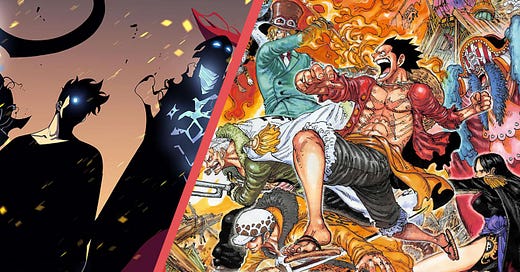Can Manga Survive The Invasion of Korean Webtoons?
For now, webtoon is the only threat that can end the reign of manga
Ever since the worldwide release of Akira back in 1988, Japanese anime has enjoyed a rising support and popularity among the global audiences. This popularity is further enhanced by the continuous appearance of iconic and fans-beloved anime, such Dragon Balls, One Piece, Naruto, Demon Slayer, and many others throughout the years.
Since most of these anime are adapted from original manga, the increase of popularity of the anime translates directly into the increased sales of its source material as well. That’s why we are pretty much in the golden age of manga right now. To put things into perspective, Demons Slayer manga has reportedly outsold the entire American Comic Book Industry back in 2020. That is one manga title outperforming a whole goddamn industry.
The Rise of Webtoon
While manga is busy enjoying its best years, there’s a new competitor slowly creeping up from behind that threatens the reign of the long-time champion. It’s called Webtoon, it’s from South Korea (SK), and it has taken the world by storm. Webtoon is not SK’s first attempt at creating comic books. That would be something called Manhwa, which is pretty much the SK’s version of Japanese manga. Black and white illustration, about ten or so chapters per volume, and printed mostly in the same paper size as a manga.
While Manhwa managed to gain quite a decent amount of followings, it never came close to its Japanese counterpart. But then the age of smartphones and apps comes along, and South Korea comes up with a new way to publish and consume comic books. One that takes full advantage of the fact that most people spend an absurd amount of time on their smartphones, rather than sitting down and reading a book.
So a new comic book platform appears that focuses solely on the smartphone's vertical orientation and its ability to display bright and vibrant colors. It’s called Webtoon. Quick disclaimer, I don’t know whether South Korea is the birthplace of Webtoons, but it is definitely the one that popularized it, specifically a company called Naver.
With titles like Noblesse, God of High School, Tower of God, and Solo Leveling, all of which can be read through an app that is available on both Android and iOS, the world slowly but surely embraces this new form of sequential art. And as the years goes by, it becomes more and more popular, especially when those aforementioned titles received anime adaptations.
Can Webtoon Overthrown Manga?
So the question is, can South Korea’s latest comic book innovation overtake the undisputed market leader in the industry? Can manga survive the invasion of Korean Webtoons? For me, the answer to both questions is yes and no. Because there are two ways to look at this interesting development. Content and distribution.
Content-wise, there are tons of new titles coming to the Webtoon app all the time, while the ongoing titles are still posting new chapters regularly. However, that amount is still dwarfed by the massive backlog of manga titles that has accumulated since the 1940s. We’re talking tens of thousands, if not hundreds of thousands, of manga titles with tons of new ones currently in progress. So when it comes to content, manga wins hands down. There’s nothing to worry about in that regard.
When it comes to distribution, however, that’s when webtoon gains the upper hand. You see, for the most part, manga is still in the book selling business. Be it a weekly publication or specially made volumes, all of them are printed in a traditional book format and sold to the readers, just like any other books. That means if the readers want to read a manga, they need to know where to look for it and hope that it’s in stock.
That being said, there are numerous manga publications out there, each with their own way to market and distribute their books. Some are friendly to the global market, while others focus solely on the Japanese market. Some keep publishing their biggest hits, while others only print their books in limited numbers. That makes it quite difficult for readers to find new titles to read. Some might even find it difficult to complete their collection, especially on old titles that are no longer in print.
Compare that to the webtoons that are housed within a single app, then it’s clear why webtoon is superior when it comes to the distribution side of the business. One click is all you need to find every chapter of any particular title. And since it is an app, the algorithm will spit out new titles for you to read based on your reading preferences. If that’s not enough, you can simply head to the “Most Popular” or “Editor’s Pick” sections and give any of the titles there a try. There’s also a section for “New Arrival” if you’re in the mood to try something new.
That is just scratching the surface when it comes to the app’s ability to give you new titles to read. Not to mention that while there are quite a few webtoon companies out there, Naver’s Webtoons is still the biggest one of the bunch. So installing that one app should be enough to satisfy your daily dose of webtoons.
The Future of Manga Industry
To be fair, the manga industry has taken some steps to ensure they get a piece of the digital comic books market. Decisions such as actively digitizing old titles, simultaneously publishing the physical and digital chapters of ongoing titles, creating websites and apps where readers can read said titles, etc. So manga is slowly following webtoon’s lead when it comes to digital distribution.
However, there are still issues such as slow updates due to the sheer number of titles that needs to be digitize, the fact that each publications tend to make their own app so readers are forced to install different ones if they want to read them all, different approach to monetization, bad translation due to rushing to deliver digitized titles, censorship due to the nature of housing the app in Google and Apple’s app stores, so on and so forth.
So can manga survive the invasion of South Korean’s webtoon? Yes it can, but it will certainly be a bumpy road ahead.





